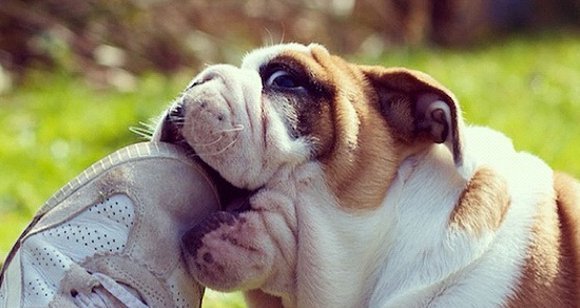5 Tips on How to Stop Your Puppy From Biting and Nipping

Enjoy engaging with your new puppy but unsure how to halt their biting or nipping behavior?
No need to fret! Your puppy is most likely just getting used to its shiny new teeth and hasn’t quite yet learned biting etiquette from other playmates.
Biting and nipping habits tend to form naturally among young pups as they go through teething, i.e. when they start growing new teeth.
Training your dog not to bite too often, or too hard, isn’t very complicated. You merely need to make sure it knows when it’s going in a little heavy with its teeth.
Here we’ll run through some common tips to deal with the teething phase, and how to stop your puppy from biting and nipping too much.
Why Puppies Tend to Bite When They Teethe
Naturally, anyone would be curious in such a situation – remember testing out your new teeth as a kid once your milk teeth started falling out?
Well, it’s pretty much the same thing with dogs, except, where dogs are concerned, their teeth are as good as hands – they use it to probe, handle and manipulate things.
And they especially like to explore the abilities of their newly acquired teeth when they’re bored or want attention.
Most of the techniques to stop your puppy from biting, therefore, involve teaching it moderation when it comes to using its teeth. Bite too much, or too hard – and the fun stops.
Tips to Stop Puppy Biting
1. Playing and Interacting with Socialized Dogs
Meeting and playing with other dogs who know “biting etiquette”, such as it is, is one of the best ways for a puppy to learn the ropes when it comes to using its teeth when interacting with other people or animals.
Bite too hard or too often, and you’ll likely lose a playmate, or worse, get a sharp nip back in indignation.
2. Using Your Hands
Let your puppy learn how to be gentle with its teeth by being more “hands on”, especially when it’s growing up.
Feeding and playing with your hands allows your puppy to learn when it’s using too much force.
If your puppy bites down too hard, make your hand go limp and try to mimic the yelping, or at the very least, utter a sound that clearly indicates you are protesting, or in pain, so the puppy realizes it’s in the wrong.
Don’t jerk your hand, or try to pull away, though, as this normally causes dogs to instinctively bite down harder so as not to let their prey “get away”.
3. Using Toys
Toys are an excellent target for pups and dogs to vent all their pent up biting urges.
Being well mannered and gentle is all fine, but sometimes a pup’s gotta cut loose and go all out.
Chew toys are excellent for this, and they can also be used in training to redirect the puppy’s attention and urges when it strays.
4. Training Using Treats and Rewards
It’s important to praise and reward good behavior when you’re training your pup. How else would it know good behavior from bad?
Keep some treats in hand, and whenever your puppy starts biting and nipping at you, stop and wait for it to calm down.
Once it calms down, reward it with a few treats, or its favorite chew toy.
The idea is to communicate that not biting or nipping leads to good things.
5. Using Products that Put Them Off
When rewards and treats don’t really work, sometimes you need to turn to training methods that actively discourage your dog from chewing or mouthing things.
Deterrent sprays are products whose scent or taste dogs really dislike, and which may be applied to things your puppy particularly loves chewing or nibbling on.
Make sure you reinforce the deterrent by applying it regularly, once a day for a week or two so your pup learns it isn’t meant to bite down on that particular object.
Have you tried out these tips to help your pup to stop biting? Any more tips you want to share? Comment below, Like, and share!


I have a 4 month old Yorkie and he used to be a biter! The one thing that seems to work the best, at least for my nipper, is to mimic a dog cry. I heard a dog trainer on tv do a yip and that’s the yip I tried when I first got the pup. He responded to it instantly. Of course I have to yip at him periodically to remind him not to bite. Pups have short memories as we all know.
Why are you responding to a Yorkie on a bulldog site? I like the avoidance method. Idk if I “yip” if it would work!